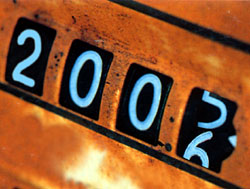 As we say good bye to 2005, it is hard to be optimistic about the new year. Sometimes, a single event is a pointer to the future. King Gyanendra this week appointed Laxmi Bahadur Nirala as the new Attorney General. Earlier, he accepted the resignation of Pawan Kumar Ojha, reportedly tipped for justice in the Supreme Court.
As we say good bye to 2005, it is hard to be optimistic about the new year. Sometimes, a single event is a pointer to the future. King Gyanendra this week appointed Laxmi Bahadur Nirala as the new Attorney General. Earlier, he accepted the resignation of Pawan Kumar Ojha, reportedly tipped for justice in the Supreme Court. Both were lacklustre lawyers picked from obscurity solely on the basis of unflinching loyalty to absolute monarchy. Their last contribution to the cause of rule of law has been defending the constitutionality of the RCCC-perhaps the only body in the free world empowered to probe, prosecute, and punish just about anyone it deems guilty.
Nepal may have the best constitution in the world as Chief Election Commissioner Keshab Raj Rajbhandari continues to insist, but we are unlikely to see it functioning properly even in 2006. In fact there is more confrontation around the corner as the country lurches along the path of 'monarchical democracy', a Panchayat-era notion propounded recently by one of its last surviving dinosaurs,
Tulsi Giri.
Leaving aside the question of political, constitutional, socio-cultural legitimacy of the current regime, 2005 saw its dismal failure in even the fundamental test of any authoritarian regime: maintaining law and order. By refusing to even respond to the unilateral ceasefire declared and extended by the insurgents, let alone take proactive measures to initiate a peace process, it proved that its priorities are different from those of the people.
One can make a fairly educated guess what those priorities are. It's clear that addressing the concerns of the Maoists or mainstream parties is still not in the agenda of his government. The regime is engaged in establishing the unquestioned authority of the palace with single-mindedness that defies logic.
A quick review of 2005 is also a checklist of February First and its aftermath. A whole new superstructure has been created to restore the Panchayat with handpicked sycophants in every branch of government. Continuity in such a system requires that their legitimacy is never questioned.
The past year has been a period of lost hope and missed opportunities squandered away in a spiral of self-destructive confrontation between the palace and the people. December 2004 had ended in confusion. By January 2005 rumours were rife that Sher Bahadur Deuba had opened informal channels of communication with the Maoists to hold long overdue parliamentary elections. King Gyanendra reacted on 1 February, 2005 by dismissing the prime minister, put political leaders under house arrest, severed telephone lines, cut the internet, sent soldiers into newsrooms, imposed a state of emergency and assumed all state powers on the strength of a single royal proclamation. That he had the full backing of the Royal Nepali Army was abundantly clear. The year of the hawks had begun.
In retrospect, the First February takeover was perhaps necessary to complete the process that was set in motion with the dissolution of parliament on 22 May, 2002. King Gyanendra needed to test his hypothesis that in his kingdom all state power emanated from the institution of monarchy. Few bought this logic, but who were we to question it? The problem with military-backed coups is that the engine doesn't come with a reverse gear.
The Nepali Times office is shifting in the new year. Pointing out the chaos around his desk, a perceptive colleague remarked optimistically: "This is the storm before the calm."



